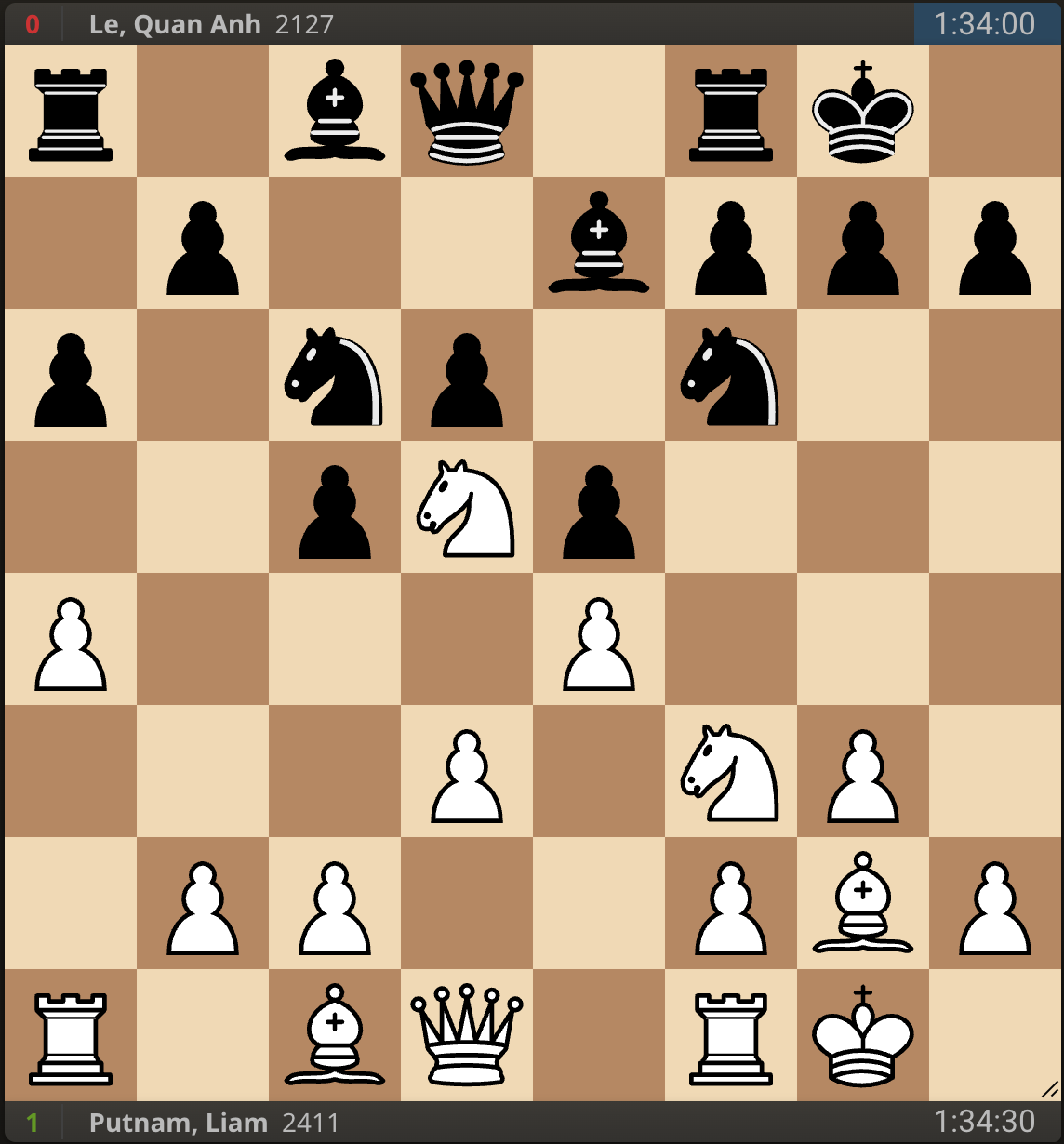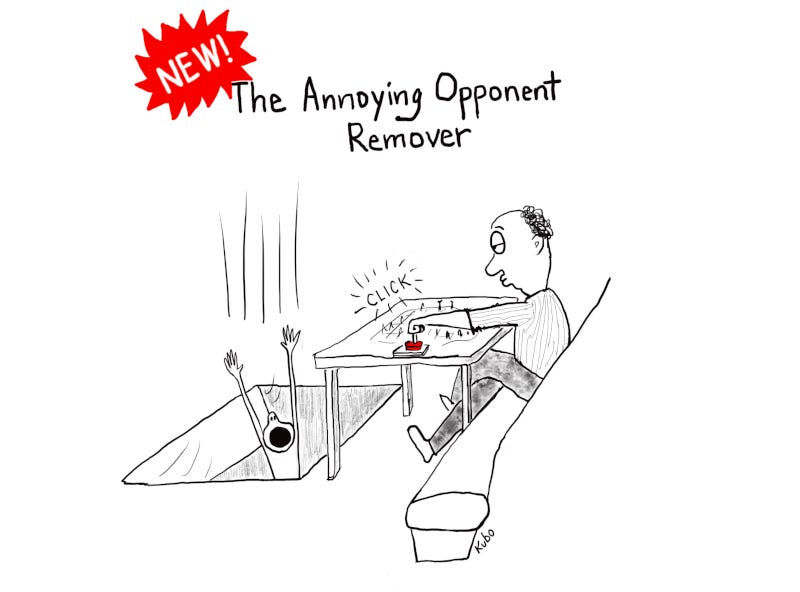The Marshall Spectator
March 19, 2025
In This Issue: From The Skittles Room Games Analyzed, by GM Aleksandr Lenderman Across the Table, with Kimani Thompson Chess Toons En Passant Problems, Problems, curated by Alexander George Editor's Note
Welcome back, fellow chess players, to this edition of the Marshall Chess Club's fortnightly bulletin, The Marshall Spectator.
In celebration of Women’s History Month, The Marshall Chess Foundation sponsored a wonderful event featuring GM Susan Polgar, who visited our historic club for a discussion of her life, accomplishments as a chess player, and her new book Rebel Queen: The Cold War, Misogyny, and the Making of a Grandmaster. The Marshall Chess Foundation sponsored several free memberships for female audience members during the event and also sponsored a full buffet of delectable comestibles and refreshments for attendees.
A very special thank you to IM Rusadan Goletiani who was the moderator for the event, as well as Vice President Larry Price, who spoke on behalf of the Marshall Chess Foundation. If you were unable to attend, you can see the discussion and Q and A in its entirety here.
Once again, we are thrilled to welcome back IM Silas Lund to give another online class on Complex Endgames. The class began on Monday, March 10, and will continue into April. This class is sure to strengthen your understanding of complex endings and all five sessions are just $100.
Spring break camps are in session at the club! You can register your child here. If you have any questions, please email td@marshallchessclub.org
Further ahead on the calendar, we are excited to share with you that summer registrations are open for our summer camps here. In addition to GM Djurabek Khamrakulov, the summer camps will feature GMs Andrei Maksimenko, Alexander Shabalov, and Oliver Barbosa as instructors, with many other guests to be announced!
We look forward to sharing more details about the camps with you in the coming weeks, including discounts and changes to the camp schedule.
Looking back over the last two weeks, we have had a plethora of events for our members to play in.
The Women & Girls Open on March 14 had 14 players registered and was won by Min Hee Chong and Victoria Almonte who scored a perfect 3 out of 3 to win $63 each.
The FIDE Blitz on March 14 had 51 players registered and was won by GM Mark Paragua who scored a perfect 9 out of 9 to win the $250 first-place prize. Santhosh Ayyappan and Linxi Zhu won $93.75 each for their 7 out of 9 score. Kevin Liu and Aadeesh Shastry scored 6 out of 9 to win $62.50, while Radu Murgescu, Daniel Yedidia, and David Bernat won $20.83 each for their 6 out of 9 score.
The Thursday Action on March 13 had 43 players registered and was won by IM Kevin Wang and IM Jay Bonin, who scored 4 out of 4 to win $131.50 each. Alec Hyunmook Choi scored 3 out of 4 to win $79, while the following 5 players won $31.60 each for their 3 out of score: FM Leif Pressman, Aakaash Meduri, Sarathi Ray, Jack Yang, and Mitchell Stern.
The Rated Beginner Open on March 9 had 18 players registered and was won by Logan Shmulenson and Lucas Ma who scored 3 out of 3 to win $101.50 each.
The FIDE Premier Open that concluded on March 9 had 28 players registered and was won by IM Liam Henry Putnam who scored 5 out of 5 to win the $640 first-place prize. Santhosh Ayyappan and Marzouq Chowdhury scored 3.5 out of 5 to win $280 each.
The FIDE Premier Under 2000 which concluded on March 9 had 32 players registered and was won by Jin Ma who scored 4.5 out of 5 to win the $534 first-place prize. Nivaan Shrivastava scored 4 out of 5 to win $214, while Myles Sussman won a class prize of $160 for his 2.5 out of 5 score. Jacky Zheng won a class prize of $134 for his 1 out of 5 score, while Leah Yang, Liam Kojuharov, and Ben Davar won $53.33 each for their 3 out of 5 score.
The Under 2000 Morning Action on March 8 had 32 players registered and was won by Thomas Li who scored a perfect 3 out of 3 to win the $194 first-place prize. The following 5 players won $15.60 each for their 2.5 out of 3 score: Daguy Vaval, Brendan Moran, Riju Bhattacharjee, Mathew Brady, Juan Gestoso. No fewer than 12 players scored 1 point, winning a $9.75 prize each: Luca Buratti, Akria Endo, Hugh William Verrier, Eugene Bang, Arjun Murti, Fionn Cavanagh, Marko Scekic, Timothy Blomquist, Assau-Temir Mailybayev, Andrew Ayers, Washington Johnson, and David Johnson.
The Thursday Action on March 6 had 35 players registered and was won by FM Marcus Miyasaka who scored 4 out of 4 to win the $128 first-place prize. GM Mark Paragua and Alexander Fikiet scored 3.5 out of 4 to win $74.50, while the following 6 players won $21.33 each for their performance: Aakaash Meduri, Joshua Block, Daniel Wang, Alec Hyunmook Choi, Jose De Villa, and Najee-Ana Walthrust.
The Afternoon Game 50 on March 6 had 10 players registered and was won by William Chan who scored a perfect 2 out of 2 to win the $15 first place prize.
The Weekly Under 1600 which concluded on March 5 had 33 players registered and was won by Daniel Fusco, who scored 5 out of 6 to win $267. Prabhat Mahadevan Nagarajan and Edward Bull scored 4.5 out of 6 to win $133.50 each, while Shreyo Banerjee and Sebastian Konzelmann scored 4 out of 6 to win $53.50 each.
The Weekly FIDE Under 2200 that concluded on March 5 had 32 players registered and was won by Aleksandr Gutnik who scored a perfect 6 out of 6 to win the $310 first-place prize. David Timmerman scored 4.5 out of 6 to win the $207 second-place prize. Richard Koppenaal scored 4 out of 6 to win a class prize of $104. Tyler Ross also won a class prize of $52 for his 3.5 out of 6, while the following 4 players won $26 for their 4 out of 6 score.
The Monday FIDE Open that concluded on March 3 had 27 players registered and was won by Aleksandr Gutnik who scored a near perfect 5 out of 6 to win the first place prize of $270. Quan Anh Le scored 4.5 out of 6 to win $180, while the following players won $45 each: Mubassar Uddin, Bryan Weisz, Micklas Breskin, David Deng, and Leqi Han.
The Monday Under 1800 that concluded on March 3 had an even 30 participants and was won by Richard Koppenaal who scored a near perfect 5.5 out of 6 to win the $194 first-place prize. Leo Paas scored 4.5 out of 6 to snag the second place prize of $145, while Ben Davar, Jack Murtagh, and Mark Limperis shared 3rd place with their 4 out of 6 performance to earn $32.33 each. Isaiah Cyprien also scored 4 out of 6, to win a class prize of $97, while Kevin Reim and Thyge Knuhtsen shared the remaining prize winning $24.50 each for their 3.5 out of 6 performance.
The Marshall Quads on March 2 had an incredible turnout, with 21 full quads and a small swiss of 7 players competing for prizes in each section. The following players won $50 for winning their section: Elliott Goodrich, Rohan Lee, Theo Pimanoff, WCM Alice Chovanec, Boris McCoy, Grayson Xiang, Gavin Liu, Akeil Williams, Melanie Liang, Mason Zhou, Andrew Chan, Myra Nigam, Fabrizzio Quionez, and Aadi Doshi. The following players won $25 for their performance, splitting the prize for the top spot in their section: CM Chenxuan Ling, Ethan Kozower, WCM Arabella Fang, Phineas Weingarten, Isaac Lui, Leqi Han, Justin Rosales, Daisy Yuen, Jacob Modzeleski, Kyle Cheng, Liam McPeake, and Jameson Wong. Finally, the following players had a three-way split for the prize in their section, winning $16.67 each: Theodore Shin, Jayden Chan, Adam Gordon, Cian Pathange, Ben Davar, and Avin Pawar.
We look forward to seeing you at the club soon!
Marshall Chess Club Games Analyzed, by GM Aleksandr Lenderman
Round 1: Putnam, Liam - Gartenlaub, Corin
You can play through the games with annotations here.
Liam Putnam had an incredible tournament, convincingly sweeping the field with 5/5. It all started with this game against the young talent Corin Gartenlaub.
1. e4 d6 2. d4 Nf6 3. Nc3 e5 4. Nf3 Nbd7 5. Bc4 Be7 6. O-O O-O 7. Re1 c6 8. a4 Re8 9. a5 h6 10. h3 Qc7 11. Be3 exd4 12. Nxd4 Bf8 13. Bd2 (13. Bf4) 13... Nc5
(13... Ne5 This would've equalized more or less.) 14. Qf3 Ne6 15. Nf5 Now, White has a winning initiative.
15... Nd7 16. Qg3 Kh7 17. f4 Nf6 18. e5 dxe5 19. fxe5 Ng8 20. Nd6 Bxd6 21. exd6 Qd8 22. Rf1 Nf6 23. Rae1 Qxa5 24. Bd3+ Kh8 25. Rxf6 gxf6 26. Qh4 Qc5+ 27. Be3
A powerful performance by White. 1-0
Round 1: Carey, Michael - Mottola, Max
This was a nice quick miniature by Max Mottola in round 1.
1. Nf3 d5 2. e3 Nf6 3. c4 e6 4. Nc3 b6 5. cxd5 exd5 6. b3 Bb7 7. Bb2 Nbd7 8. Rc1 a6 9. Ne2 c5 10. d4
This is a natural move but it turns out to be a bit premature here. (10. g3 d4 (10... Bd6 11. Bg2) 11. Bg2)
10... c4! Black gives up a pawn for a strong initiative. 11. bxc4 dxc4 12. Rxc4 b5 13. Rc1 (13. Rc2) 13... Bb4+ 14. Nc3 (14. Bc3) 14... Qa5 15. Nd2 (15. a3)
15... Rc8 16. Nb3 Qxa2 17. Nd2 Qxb2 18. Rc2 Qa3 19. Ncb1 And White resigned here. Very strong play by Black. 0-1
Round 2: Mottola, Max - Putnam, Liam
This was a very important battle in round 2 between master Max Mottola who had a powerful miniature round 1 win and Liam Putnam, also with a convincing round 1 win.
1. e4 c6 2. d4 d5 3. Nc3 dxe4 4. Nxe4 Nf6 5. Nxf6+ exf6 6. Be3!? A very interesting sideline that Wesley So trotted out a few times. (6. Bd3 Qxd4 7. Nf3 Qd8) (6. c3)
6... Be6 7. Bd3 Bd6 This is the idea of white's setup. White first plays Be3 to guard d4. 8. Ne2 Qc7 (8... Nd7) 9. c4 c5 (9... f5) 10. d5 Black reacted poorly and White has a sizable advantage now.
10... Bg4 11. Qd2 (11. f3 Would give white a big edge, for example 11... Bh5 12. Nc3 O-O (12... Bxh2 13. Qe2 O-O 14. d6 Qxd6 15. O-O-O) 13. Nb5)
11... Nd7 (11... Bxe2) 12. f4? This loses most of White's edge and Black stabilizes. (12. Nc3 Would be much stronger and would strongly discourage 0-0-0 since. 12... O-O-O 13. Nb5 Qb8 14. h3 Bh5 15. b4)
12... Bxe2 13. Qxe2 O-O-O Now Black more or less equalizes and the game will remain balance all the way until the endgame.
14. O-O g6 15. Bd2 f5 16. Bc3 Rhe8 17. Qd2 Be7 18. Rae1 Bf6 19. Bc2 Bxc3 20. Qxc3 Rxe1 21. Qxe1 Qb6 22. Qc3 Qf6 23. Qxf6 Nxf6 24. Re1 Kd7 25. Kf2 a6 26. Bd3 Rb8 27. a4 Kd6 28. b3 Re8 29. Rxe8 Nxe8 30. Ke3 Kc7 31. Kd2 Kb6 32. Kc3 Nf6 33. Be2 Kc7 34. Bf3 b6 35. Kd3 Kd6 36. Kc3 h6 37. h4 Ne8 38. Kd3 Ng7 39. Ke3 Ke7 40. Kd3 Ne8 41. Ke3 Nd6 42. Kd3 Kf6 43. g3 Ke7 44. Ke3 Nb7 45. Kd3 Kd6 46. Kc3 Kc7 47. Kd3 Nd6 48. Kc3 h5 49. Bg2 b5 50. axb5 axb5 51. Bf3 Kb6 52. Bg2 Ka5 53. cxb5 Kxb5 54. Bf1+ Kb6 55. Bd3 Ne4+ 56. Kc4 Kc7 (56... Nxg3 57. d6)
Black did an excellent job at keeping the tension, not hurrying with decisive actions, and continuing to ask questions. Finally, after a long endgame, White was put in a position where only one move draws, and cracks.
57. Bxe4? Miscalculation (57. b4! Was the only drawing move. 57... cxb4 58. Kxb4 (58. Bxe4 Also works, basically changing the move order. 58... fxe4 59. Kxb4 Kd6 60. Kc4 e3 61. Kd3 Kxd5 62. Kxe3) 58... Nxg3 59. Kc5 Ne4+ 60. Kd4 Despite an extra pawn, Black cannot make progress, although certainly, Black would continue trying to press for a long time. (60. Bxe4 fxe4))
57... fxe4 58. b4 58... e3! Maybe this was overlooked by White. (58... cxb4 59. Kxb4 e3 (59... f5 60. Kc3 Kd6 (60... Kd7 61. Kc4 Kc7 62. Kd4 Kd6 63. Kc4 e3 64. Kd3 Kxd5 65. Kxe3 Kc4 66. Ke2 Kd4 67. Kd2 Ke4 68. Ke2) 61. Kd4) (59... Kd6 60. Kc4 e3 61. Kd3 e2 (61... Kxd5 62. Kxe3) 62. Kxe2 Kxd5 63. Ke3 (63. Kd2 Kd4 64. Ke2 Ke4 65. Kf2 Kd3 66. f5 (66. Kf3 f5 67. Kf2 Kd2 68. Kf3 Ke1 69. Kg2 Ke2 70. Kg1 Kf3 71. Kh2 Kf2 72. Kh3 Kg1))) 60. Kc3 Kd6 61. Kd3 Kxd5 62. Kxe3 f5 (62... f6 63. Kd3 f5 64. Ke3 Kc4 65. Ke2) 63. Kd3)
59. Kd3 cxb4 60. Kxe3 Kd6 61. Kd4 b3 62. Kc3 62... Kxd5 Black wins as they pick up all of White's kingside pawns. A good endgame grind in an equal position, which shows the resiliency of the strong IMs and GMs, being able to create chances even in the most dry positions. 0-1
Round 3: Putnam, Liam - Le, Quan Anh
After winning a long endgame grind in round 2, Liam won a quick one with white in round 3 against Quan Anh, who had a great performance in the U2400 recently. Liam ended up winning his last two games as well, and ended up with a very impressive 5/5 sweep, which is not surprising given how well he's played in the first three games.
1. Nf3 Nf6 2. g3 c5 3. Bg2 Nc6 4. O-O e5 5. e4 Be7 6. d3 O-O (6... d5) 7. Nc3 d6 8. a4 a6 9. Nd5
White got some advantage in the opening. 9…Nxd5 10. exd5 Nb8 11. Nd2! Nd7 12. a5 b5 13. axb6 Nxb6 14. Nb3! Bb7 15. c4 f5 16. Na5 Qc7
17. b4! White quickly broke through. 17... cxb4 18. c5 dxc5 19. Nxb7 Ra7 (19... Qxb7 20. d6) 20. Na5 Bd6 21. Bb2 e4 22. dxe4 fxe4 23. Bxe4 c4 24. Bd4 c3 25. Nc6 Raa8 26. Qh5 Another powerful performance by Liam Putnam getting him to 3/3. Liam ended up winning his last two games as well, and ended up with a very impressive 5/5 sweep, which is not surprising given how well he's played in the first three games. 1-0
Round 3: Gartenlaub, Corin - Bonin, Jay
I chose this endgame example as I found it to be very instructive.
1. e4 e5 2. Nf3 Qe7 3. Nc3 c6 4. d4 d6 5. a4 a5 6. h3 g6 7. Be3 Bh6 8. Bxh6 Nxh6 9. dxe5 dxe5 10. Qd2 Ng8 11. O-O-O Nd7 12. Bc4 h6 13. Nh2 Qg5 14. Qxg5 hxg5 15. Nf3 f6 16. Nd2 Nb6 17. Bb3 Nh6 18. Ncb1 Nf7 19. Na3 Nd6 20. f3 Ke7 21. Ndc4 Nbxc4 22. Nxc4 Nxc4 23. Bxc4 Be6 24. Bxe6 Kxe6 25. Rd3 Rhd8 26. Rhd1 Ke7 27. Rxd8 Rxd8 28. Rxd8 Kxd8 29. Kd2 b5 30. axb5 cxb5 31. c4 Kc7 32. Kc3 Kb6
This game wasn't very eventful and was heading to a draw until the pawn endgame. Jay already lost a game and had a half point bye in round 1, leaving him in must-win situations the rest of the tournament, so it's understandable that he looked for any way possible to create chances. Unfortunately for him, he also created a big chance for the young rising star, Corin Gartenlaub, and Corin took full advantage of the opportunity.
33. b4 f5?? A miscalculation. This move actually loses in two different ways. (33... axb4+ 34. Kxb4 bxc4 35. Kxc4 Kc6 Black should've objectively just acquiesced to a draw here, but of course, that would mean the end of chances to fight for anything in the tournament.) (33... a4 Was also a dead draw.)
34. bxa5+! From this point on, Corin finds 8!!! only moves to win in a row! Very clinical conversion on Corin's part, and his calculation was definitely up to the task in this game. (34. cxb5?? Knowing Jay and how tricky of a player he is, especially in the endgame, my guess would be he calculated this, and spotted a nasty trap, and might've wanted to bait Corin, the lesser experienced player to fall into it, but Corin was up to the task and was very accurate. 34... a4! Suddenly White went from winning to losing. It turns out White is the one in Zugswang here. That's why it's important to be so careful in pawn endgames, as one subtle mistake can shift the position from winning to losing! (34... Kxb5?? Would just lose routinely to 35. bxa5 Kxa5 36. Kc4) 35. Kc4 (35. Kb2 Kxb5 36. Ka3 f4 (36... fxe4 37. fxe4)) 35... f4) (34. c5+! Also wins but more complicated. 34... Kc6 35. bxa5 (35. Kb3 a4+) 35... Kxc5 36. Kb3 f4 37. Ka3! (37. Kc3 b4+ 38. Kb3 Kb5 39. a6 Kxa6 40. Kxb4 Kb6 41. Kc4 Kc6) 37... b4+ 38. Ka4 Kc4 39. a6 b3 40. a7 b2 41. a8=Q b1=Q 42. Qd5+ Kc3 43. Qxe5+ $18 Kc4 44. Qd5+ Kc3 45. Qc5+) (34. exf5? It is also a tempting option, which maybe Jay calculated, but it leads to a draw. 34... gxf5 35. g3 a4 (35... f4 36. gxf4 axb4+ (36... exf4 37. bxa5+ Kxa5 38. cxb5 Kxb5 39. Kd4) 37. Kxb4 e4 38. fxe4 gxf4 39. e5 f3 40. e6 f2 41. e7 f1=Q 42. e8=Q) 36. h4 gxh4 37. gxh4 e4 38. fxe4 fxe4 39. c5+ Kc6 40. h5 a3 41. h6 a2 42. Kb2 e3 43. h7 e2 44. h8=Q e1=Q)
34... Kxa5 35. c5! b4+ The most resilient. (35... Ka6 36. Kb4 f4 37. c6 Kb6 38. c7 Kxc7 39. Kxb5)
36. Kc4 (36. Kb3 Kb5) 36... b3 (36... Ka4 37. c6 b3 38. c7 b2 39. c8=Q b1=Q 40. Qa8#) (36... f4 37. c6 Kb6 38. Kxb4 Kxc6 39. Kc4 Kd6 (39... g4 40. fxg4 g5 41. Kd3) 40. Kb5)
37. Kxb3 Kb5 38. c6! The key winning idea. 38... Kxc6 39. Kb4! (39. Kc4 Not this since 39... f4 And White is the one in Zugswang and has to give up opposition. 40. Kb4 Kb6 41. Kc4 Kc6)
39... Kb6 (39... f4 40. Kc4) 40. Kc4! Important detail as starting with g3 allows a draw. (40. g3? g4 41. fxg4 f4 42. gxf4 exf4 Now, White must move the king to stop the pawn immediately, which allows g5 with a fortress due to a protected passed pawn. 43. Kc3 g5)
40... Kc6 41. g3 Now, Black is the one who has to give up the opposition. 41... g4 The best practical try. (41... f4 42. g4)
42. fxg4! Again, very accurate! (42. hxg4? Would be careless and allow a draw after 42... fxg4 43. fxg4 (43. f4 exf4 44. gxf4 g3) 43... g5)
42... f4 (42... fxg4 43. h4! Would be the point. 43... Kd6 44. Kb5 Ke6 45. Kc5) (42... fxe4 43. h4 Kd6 44. Kc3 Kd5 45. Kd2 Kd4 46. h5)
43. gxf4 exf4 44. h4 (44. g5 Also works but not) (44. e5?? g5) 44... Kd6 45. Kd4 Ke6 46. h5 gxh5 47. gxh5 f3 48. Ke3 Kf6 49. Kxf3 Kg5 50. Ke3 Kxh5 51. Kf4
In a lost pawn endgame, Jay resigns. Usually, it is the experienced IM Jay Bonin who grinds down his younger opponents in endgames, but here was a rare occasion of it being the opposite, where Jay over-pressed out of the necessity of the tournament situation. This example is also a good reminder for everyone about why it is important to calculate as precisely as possible in king and pawn endgames rather than just use general feelings/intuition. 1-0
GM Aleksandr Lenderman, Marshall Spectator Contributor
Across The Table, with Marshall Member Kimani Thompson
Kimani Thompson was the most active Marshall Chess Club member last month, playing in 9 tournaments in just 4 weeks, so the editorial board of The Marshall Spectator was thrilled to sit down and interview him for this edition of Across The Table.
Q: When did you start playing chess, and how did you learn?
In the summer of 2002, my father introduced me to the game and how the pieces moved. We would play every weekend until school started when I joined the chess club, where I picked up some basic strategies. It wasn’t until I was 12 that I got my first chess book on intermediate tactics (forks, pins, skewers, etc.). That is where the game clicked for me, and I started winning all my casual games with friends and family. Now I learn best by playing a lot.
Q: How long have you been a member of the club?
I‘ve been a member since 2019, but I have been going to the club more frequently since February 2024.
Q: What's your favorite opening trap?
I played the Budapest gambit a lot when I was younger, so any traps from that opening are pretty fun.
Q: Any great game you've played at the Marshall you'd like to share?
I have a lot of memorable games at the Marshall. Recently, I defeated an NM at the Thursday action for my 2nd upset award. I also have a queen sac game, but one of the best games I played at MCC was at the MARCH MARSHALL PREMIER -U2000 Round 1, where I played my 2nd official 90, 30+ tournament and defeated my opponent who was 300+ rating higher (my first official upset, on a long game), and a style I am aspiring to perfect as I get better. You can play through the full game with annotations here.
Q: What about yourself would you like other members to know that we may not know? Any surprising facts?
One of my life quests is to visit every country in the world and play a game of Chess and Soccer. So far, I have visited 17 countries where I have recently been to the Middle East (Bahrain, Oman, UAE) and East Africa (Kenya, Rwanda, Tanzania). So far favorite city to play chess is Paris, France, and my favorite city to play soccer is Rome, Italy
Kimani Thompson, Marshall Chess Club Member
En Passant
Chess is getting ready to make its foray into Esports with teams recruiting top players ahead of this summer's Esports World Cup, hoping to attract new audiences as the game continues to grow in spectacular fashion.
BBC Two’s new eight-episode series Chess Masters: The Endgame, aired on Monday evening at 8pm between Mastermind and University Challenge, has provoked strong but sharply divided reactions, both among television critics and seasoned chess experts and amateurs. The Guardian’s Lucy Mangan called it “so dull it’s almost unwatchable”.
The Azerbaijan Chess Federation (ACF) is thrilled to announce the Baku Open 2025, an international chess festival celebrating the game and the rise of Azerbaijani talent. The event will take place at Baku Crystal Hall from April 27 (arrival) to May 6 (last round and closing ceremony).
GM Vidit Gujrathi beat GMs Amin Tabatabaei and Richard Rapport to become the 12th and final qualifier for the 2025 Paris Freestyle Chess Grand Slam that takes place April 7-14. He'll join fellow Indian stars…
Chess Toons
Problems, Problems, curated by Alexander George
Raymond Smullyan, 1957
Where is the White King?
The author was a character. You can read about his life here. For a surreal appearance on the Johnny Carson show, see here. (Smullyan's math-nerd-does-Borscht-Belt humor left Carson cold. I can imagine Carson telling his people after the show: "Don't ever do that to me again!")
---
Last issue’s puzzle: J.-L. Turco, 1983
Solution to J.-L. Turco, 1983: Queens did not move and were captured on their home squares by enemy Knights. Each side's Knights made an even number of moves total. White's King has made an even number of moves and White's Rooks have made an odd number of moves - thus White has made an odd number of moves in total. Black's King has made an odd number of moves and Black's Rooks have made an odd number as well. Consequently, Black has made an even number of moves. So, White moved last and Black is to move. The solution is therefore: 1....Nxc2 mate (and not the illegal 1.Nxf7).
---
Alexander George
Editor's Note
As always, if you have any feedback, comments, or would like to submit an article please contact us directly at td@marshallchessclub.org.
Enjoy, and thanks for reading!
The Marshall Chess Club
23 West Tenth Street New York, NY 10011
212.477.3716
Thanks for reading The Marshall Spectator! Subscribe for free to receive new posts and support the club.





















Thank you for your very helpful hints. I wish I lived closer so I could visit your functions. I’m only 83, but still enjoy a good game of chess.